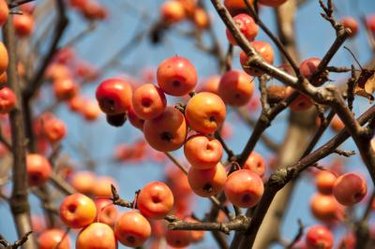
At 1/4 to 2 inches in diameter, crab apples look like miniature versions of regular apples, and you might wonder if crab apples are edible. A crab apple has a sour, pithy taste. Despite their unpleasant sharpness, crab apples generally aren't dangerous.
Tip
While crab apples aren't often eaten due to their sour taste, they aren't particularly dangerous. The pits and seeds of many fruits contain chemicals that metabolize into toxins, but this part of the fruit isn't typically eaten.
Video of the Day
Crab apples might give you a sore stomach if you eat a few, but they won't cause poisoning. Like regular apples, their seeds do contain toxins. However, you would have to eat them in huge doses to experience any serious problems.
Video of the Day
Read more: Apple Seed Benefits
Are Crab Apples Edible?
Crab apples usually aren't grown for their fruit. The little crab apples are so sharp and bitter that most people just spit them right out again. You can use some slightly mellower larger crab apple varieties for jam making.
Flowering crab apple trees are attractive in gardens. Like their close cousin, the apple, crab apple trees often bloom in pretty white or purple flowers. This makes them useful as an ornamental species.
Understand Apple Toxicity
Crab apples are essentially the same species as apple trees. The seeds of both of these trees contain chemicals that are metabolized into cyanide, called cyanogenic glycosides. However, as pointed out by the Centers for Disease Control and Prevention, the edible parts of pitted and seeded fruits contain very low amounts of these chemicals.
Despite the presence of cyanide in the seeds, most people don't eat the core. Even when apple seeds are ingested, they usually pass through the gut without being broken down. You would have to eat lots of crab apple seeds and grind or chew them up for the cyanide to take effect.
Supervise Your Pets
Crab apples may present more danger for pets, such as dogs. Animals that consume a few crab apples may show signs of discomfort, according to experts at the ASPCA. In serious cases, if a pet eats lots of crab apples, including stems, leaves and seeds, they could show signs of cyanide poisoning.
Dogs rarely eat enough plant matter for this to cause a real problem. Horses, sheep, cows and other herbivorous animals may eat crab apples in large enough quantities to trigger some toxic effects.
Take Some Precautions
If you're worried that crab apple fruit is dangerous, remove the core, stem, leaves and any seeds from the fruit before use. These are the only parts with the toxic cyanogenic glycosides.
The tart flesh of crab apples doesn't contain the poisonous substance. You can use the white flesh alone in your jams, jellies and bitter tarts, as recommended by Iowa State University, without exposing yourself to danger. Of course, as with any fruit, avoid rotten or moldy fruit which can cause food poisoning.